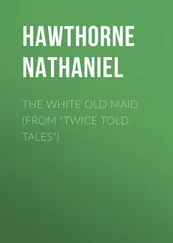A moment afterwards, I heard a voice at a little distance behind me, speaking so sharply and impertinently that it made a complete discord with my spiritual state, and caused the latter to vanish as abruptly as when you thrust a finger into a soap-bubble.
“Halloo, friend!” cried this most unseasonable voice. “Stop a moment, I say! I must have a word with you!”
I turned about, in a humor ludicrously irate. In the first place, the interruption, at any rate, was a grievous injury; then, the tone displeased me. And finally, unless there be real affection in his heart, a man cannot, — such is the bad state to which the world has brought itself, — cannot more effectually show his contempt for a brother mortal, nor more gallingly assume a position of superiority, than by addressing him as “friend.” Especially does the misapplication of this phrase bring out that latent hostility which is sure to animate peculiar sects, and those who, with however generous a purpose, have sequestered themselves from the crowd; a feeling, it is true, which may be hidden in some dog-kennel of the heart, grumbling there in the darkness, but is never quite extinct, until the dissenting party have gained power and scope enough to treat the world generously. For my part, I should have taken it as far less an insult to be styled “fellow,” “clown,” or “bumpkin.” To either of these appellations my rustic garb (it was a linen blouse, with checked shirt and striped pantaloons, a chip hat on my head, and a rough hickory stick in my hand) very fairly entitled me. As the case stood, my temper darted at once to the opposite pole; not friend, but enemy!
“What do you want with me?” said I, facing about.
“Come a little nearer, friend,” said the stranger, beckoning.
“No,” answered I. “If I can do anything for you without too much trouble to myself, say so. But recollect, if you please, that you are not speaking to an acquaintance, much less a friend!”
“Upon my word, I believe not!” retorted he, looking at me with some curiosity; and, lifting his hat, he made me a salute which had enough of sarcasm to be offensive, and just enough of doubtful courtesy to render any resentment of it absurd. “But I ask your pardon! I recognize a little mistake. If I may take the liberty to suppose it, you, sir, are probably one of the aesthetic — or shall I rather say ecstatic? — laborers, who have planted themselves hereabouts. This is your forest of Arden; and you are either the banished Duke in person, or one of the chief nobles in his train. The melancholy Jacques, perhaps? Be it so. In that case, you can probably do me a favor.”
I never, in my life, felt less inclined to confer a favor on any man.
“I am busy,” said I.
So unexpectedly had the stranger made me sensible of his presence, that he had almost the effect of an apparition; and certainly a less appropriate one (taking into view the dim woodland solitude about us) than if the salvage man of antiquity, hirsute and cinctured with a leafy girdle, had started out of a thicket. He was still young, seemingly a little under thirty, of a tall and well-developed figure, and as handsome a man as ever I beheld. The style of his beauty, however, though a masculine style, did not at all commend itself to my taste. His countenance — I hardly know how to describe the peculiarity — had an indecorum in it, a kind of rudeness, a hard, coarse, forthputting freedom of expression, which no degree of external polish could have abated one single jot. Not that it was vulgar. But he had no fineness of nature; there was in his eyes (although they might have artifice enough of another sort) the naked exposure of something that ought not to be left prominent. With these vague allusions to what I have seen in other faces as well as his, I leave the quality to be comprehended best — because with an intuitive repugnance — by those who possess least of it.
His hair, as well as his beard and mustache, was coal-black; his eyes, too, were black and sparkling, and his teeth remarkably brilliant. He was rather carelessly but well and fashionably dressed, in a summer-morning costume. There was a gold chain, exquisitely wrought, across his vest. I never saw a smoother or whiter gloss than that upon his shirt-bosom, which had a pin in it, set with a gem that glimmered, in the leafy shadow where he stood, like a living tip of fire. He carried a stick with a wooden head, carved in vivid imitation of that of a serpent. I hated him, partly, I do believe, from a comparison of my own homely garb with his well-ordered foppishness.
“Well, sir,” said I, a little ashamed of my first irritation, but still with no waste of civility, “be pleased to speak at once, as I have my own business in hand.”
“I regret that my mode of addressing you was a little unfortunate,” said the stranger, smiling; for he seemed a very acute sort of person, and saw, in some degree, how I stood affected towards him. “I intended no offence, and shall certainly comport myself with due ceremony hereafter. I merely wish to make a few inquiries respecting a lady, formerly of my acquaintance, who is now resident in your Community, and, I believe, largely concerned in your social enterprise. You call her, I think, Zenobia.”
“That is her name in literature,” observed I; “a name, too, which possibly she may permit her private friends to know and address her by, — but not one which they feel at liberty to recognize when used of her personally by a stranger or casual acquaintance.”
“Indeed!” answered this disagreeable person; and he turned aside his face for an instant with a brief laugh, which struck me as a noteworthy expression of his character. “Perhaps I might put forward a claim, on your own grounds, to call the lady by a name so appropriate to her splendid qualities. But I am willing to know her by any cognomen that you may suggest.”
Heartily wishing that he would be either a little more offensive, or a good deal less so, or break off our intercourse altogether, I mentioned Zenobia’s real name.
“True,” said he; “and in general society I have never heard her called otherwise. And, after all, our discussion of the point has been gratuitous. My object is only to inquire when, where, and how this lady may most conveniently be seen.”
“At her present residence, of course,” I replied. “You have but to go thither and ask for her. This very path will lead you within sight of the house; so I wish you good-morning.”
“One moment, if you please,” said the stranger. “The course you indicate would certainly be the proper one, in an ordinary morning call. But my business is private, personal, and somewhat peculiar. Now, in a community like this, I should judge that any little occurrence is likely to be discussed rather more minutely than would quite suit my views. I refer solely to myself, you understand, and without intimating that it would be other than a matter of entire indifference to the lady. In short, I especially desire to see her in private. If her habits are such as I have known them, she is probably often to be met with in the woods, or by the riverside; and I think you could do me the favor to point out some favorite walk, where, about this hour, I might be fortunate enough to gain an interview.”
I reflected that it would be quite a supererogatory piece of Quixotism in me to undertake the guardianship of Zenobia, who, for my pains, would only make me the butt of endless ridicule, should the fact ever come to her knowledge. I therefore described a spot which, as often as any other, was Zenobia’s resort at this period of the day; nor was it so remote from the farmhouse as to leave her in much peril, whatever might be the stranger’s character.
“A single word more,” said he; and his black eyes sparkled at me, whether with fun or malice I knew not, but certainly as if the Devil were peeping out of them. “Among your fraternity, I understand, there is a certain holy and benevolent blacksmith; a man of iron, in more senses than one; a rough, cross-grained, well-meaning individual, rather boorish in his manners, as might be expected, and by no means of the highest intellectual cultivation. He is a philanthropical lecturer, with two or three disciples, and a scheme of his own, the preliminary step in which involves a large purchase of land, and the erection of a spacious edifice, at an expense considerably beyond his means; inasmuch as these are to be reckoned in copper or old iron much more conveniently than in gold or silver. He hammers away upon his one topic as lustily as ever he did upon a horseshoe! Do you know such a person?” I shook my head, and was turning away. “Our friend,” he continued, “is described to me as a brawny, shaggy, grim, and ill-favored personage, not particularly well calculated, one would say, to insinuate himself with the softer sex. Yet, so far has this honest fellow succeeded with one lady whom we wot of, that he anticipates, from her abundant resources, the necessary funds for realizing his plan in brick and mortar!”
Читать дальше












